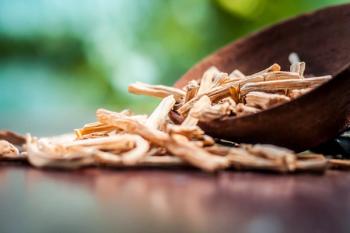
- Nutritional Outlook Vol. 23 No. 7
- Volume 23
- Issue 7
Botanical adulteration in the time of COVID-19: Laboratory perspective
Elan Sudberg, CEO of Alkemist Labs, provides insight on how the COVID-19 pandemic has accommodated botanical ingredient adulteration.
In recent months, Alkemist Labs (Garden Grove, CA), among others in the dietary supplement industry, has brought attention to the
Adulteration is nothing new to the industry, unfortunately. Demand for certain ingredients and the ensuing competition to ensure supply of a desired ingredient invite unwelcome attention from unscrupulous parties willing to sell fraudulent raw materials. The pandemic has exacerbated this typical reality to an absurd extreme.
“With the COVID-19 pandemic kicking off 2020 as a major threat to our lives, the masses have run to the healthfood stores and bought all the supplements. In turn, our clients are frantically trying to replenish inventory,” explains Elan Sudberg, CEO of Alkemist Labs. “No one predicted this in their 2020 plans for inventory and supply agreements. New vendors must be quickly qualified, and material must be fast-tracked into production to keep up with demand. To add to this challenge, the FDA informed the public that they—understandably—planned to decrease onsite inspections, which was music to the ears of the unscrupulous. The consequence of this is a fast track to more adulteration and less oversight.”
Besides the adulteration of popular immune-health botanicals such as elderberry (Sambucus nigra) with compounds such as black rice1, Alkemist Labs also discovered that Certificates of Analysis (COAs) from its own lab and other laboratories were being doctored2. The COAs are reported to have been doctored in a number of ways, including changing or removing the client name, replacing the lot number, or even going so far as changing the results of the analysis.
“Oscar Wilde said that ‘Imitation is the sincerest form of flattery.’ To me, knowing that companies overseas are actively counterfeiting our Certificates of Analysis for questionable material we have not actually tested and selling such material using our good name is way more frustrating than flattering,” says Sudberg. “This has been an issue for many years, but we’ve seen more of it with the coronavirus increasing demand for immune-support herbs. It’s an issue that the heavy hitters of the FDA identified as a threat to the supply chain when I spoke with them about it.”
While the current situation the world finds itself in is in many ways unprecedented, the adulteration taking place currently is laying bare the existing inadequacies of current Good Manufacturing Practices (cGMPs), explains Sudberg. Among these is the use of unvalidated testing methods that look good on paper but lack any substance.
“The existing cGMPs left a lot of room for dangerous interpretation that falls short of truly ‘fit for purpose’ test methods. From my understanding, there has been very little technology challenged by the FDA, which is a glaring vulnerability,” says Sudberg. “This means that material may show up as ‘lab tested’ but may still be adulterated, as those buying into the ‘too good to be true’ technology leave room for problematic ingredients to enter the supply chain.”
The solution, Sudberg says, is to question everything. This seems simple, though may be less so in the current industry landscape where business pressures may cloud sound judgement. Take nothing at face value. If you receive a COA, have it verified. If you get test results, make sure they consider adulterants common to the material. “Demand full transparency from seed to shelf, and when experiencing pushback on such, run to another vendor,” states Sudberg. “When you are responsible for ensuring that products the consumer is ingesting contain what they [should], and what your label says it does, you have to be absolutely, positively sure.”
Of course, it’s not all doom and gloom. The current moment is both a wakeup call and a proving ground for responsible industry players. “While the pandemic has stressed the supply chain and excited the unscrupulous, one silver lining is that it has woken up the industry, again, to talk about quality issues and pay more attention to supply chain challenges,” concludes Sudberg. “It’s given the good players another opportunity to show how good they truly are. Those of us who survive this temporary blip will emerge stronger and smarter than ever.”
A list of some botanicals tested by Alkemist Labs that have failed testing more consistently than normal:
- Allium sativum
- Astragalus membranaceus
- Berberis aristata
- Boswellia serrata
- Camellia sinensis
- Cannabis sativa
- Citrus sinensis
- Cocos nucifera
- Echinacea purpurea
- Equisetum arvense
- Ganoderma lucidum
- Garcinia cambogia
- Grifola frondosa
- Hericium erinaceus
- Honey
- Lepidium meyenii
- Matricaria recutita
- Melissa officinalis
- Origanum vulgare
- Panax ginseng
- Panax quinquefolius
- Phellodendron amurense
- Sambucus nigra L.
- Sophora japonica
- Stevia rebaudiana
- Trifolium pratense
- Triticum aestivum
- Vitis vinifera
- Withania somnifera
References
- Krawiec S et al. “Artemis International doubles down on exposing adulteration of elderberry extracts.” Nutritional Outlook. Published on July 6, 2020.
Accessed here . - Krawiec S et al. “Alkemist Labs warns industry of falsified certificates of analysis being circulated.” Nutritional Outlook. Published on May 18, 2020.
Accessed here .
Articles in this issue
about 5 years ago
BCAA products are diversifyingabout 5 years ago
The most effective fertility supplementsover 5 years ago
Which are turmeric’s biggest product opportunities?over 5 years ago
Botanical growth in the COVID-19 pandemicover 5 years ago
Herbal ingredient adulteration in 2020Newsletter
From ingredient science to consumer trends, get the intel you need to stay competitive in the nutrition space—subscribe now to Nutritional Outlook.




